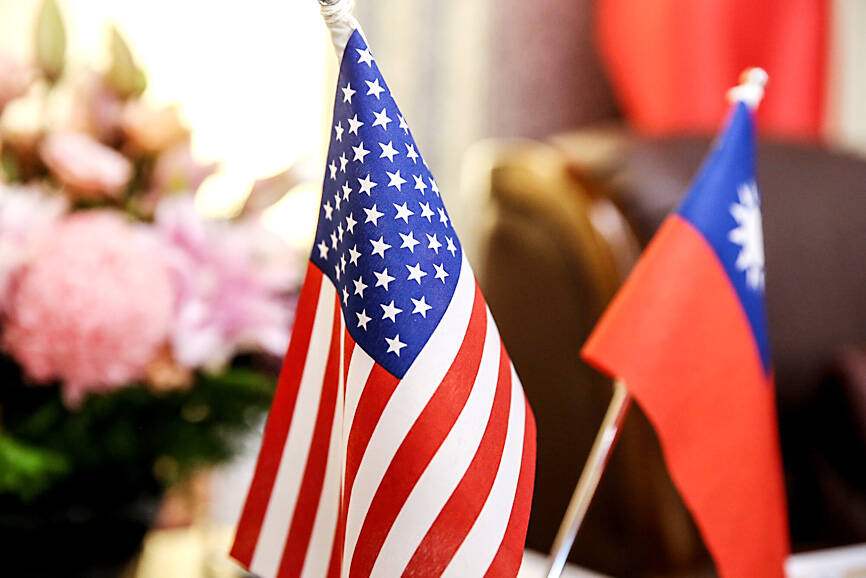Seventy-three percent of Americans would support recognizing Taiwan as an independent country in the event of a Chinese invasion, this year’s Reagan National Defense Survey found.
For their seventh annual survey, released on Thursday, the Ronald Reagan Institute conducted interviews last month with 2,510 people.
The report found that 64 percent of respondents believed that the US should make public declarations of support for Taiwanese autonomy, and 61 percent supported an increased US military presence near Taiwan to deter a possible invasion.

Photo: I-Hwa Cheng/Bloomberg
Additionally, 78 percent of respondents would support the establishment of a defense alliance to maintain peace and stability in the Indo-Pacific region, which would include Taiwan, the US and military allies such as Japan, South Korea and Australia, it said.
In the event of an invasion, support for committing US forces to Taiwan’s defense has also increased from 39 percent in 2019 to 48 percent this year.
If a conflict were to emerge, nearly 60 percent of respondents would support sending additional military equipment, including warships, and other US military assets to Taiwan, while 51 percent would support establishing a no-fly zone with the possibility of shooting down Chinese warplanes, it said.
Regarding US adversaries, 49 percent viewed China as the US’ greatest threat, while 52 percent believed the US would come out on top in a conflict with China’s People’s Liberation Army, it said.
Asked what concerns them the most about China, only 11 percent answered “China invading Taiwan,” although 28 percent responded “China’s military buildup in the South China Sea.”
Sixty-seven percent of respondents in this year’s survey viewed Taiwan as an ally of the US, up from 64 percent last year, compared with just 18 percent for China, it said.
Sixty-five percent of respondents supported placing economic sanctions on China as a deterrent, rising to 66 percent in the event of an invasion.
In light of China’s escalating military intimidation of Taiwan, the report showed bipartisan support for the implementation of diplomatic, economic and military measures to strengthen Taiwan, with 55 percent backing increased arms sales to Taiwan, it said.

US climber Alex Honnold is to attempt to scale Taipei 101 without a rope and harness in a live Netflix special on Jan. 24, the streaming platform announced on Wednesday. Accounting for the time difference, the two-hour broadcast of Honnold’s climb, called Skyscraper Live, is to air on Jan. 23 in the US, Netflix said in a statement. Honnold, 40, was the first person ever to free solo climb the 900m El Capitan rock formation in Yosemite National Park — a feat that was recorded and later made into the 2018 documentary film Free Solo. Netflix previewed Skyscraper Live in October, after videos

NUMBERS IMBALANCE: More than 4 million Taiwanese have visited China this year, while only about half a million Chinese have visited here Beijing has yet to respond to Taiwan’s requests for negotiation over matters related to the recovery of cross-strait tourism, the Tourism Administration said yesterday. Taiwan’s tourism authority issued the statement after Chinese-language daily the China Times reported yesterday that the government’s policy of banning group tours to China does not stop Taiwanese from visiting the country. As of October, more than 4.2 million had traveled to China this year, exceeding last year. Beijing estimated the number of Taiwanese tourists in China could reach 4.5 million this year. By contrast, only 500,000 Chinese tourists are expected in Taiwan, the report said. The report

Temperatures are forecast to drop steadily as a continental cold air mass moves across Taiwan, with some areas also likely to see heavy rainfall, the Central Weather Administration (CWA) said. From today through early tomorrow, a cold air mass would keep temperatures low across central and northern Taiwan, and the eastern half of Taiwan proper, with isolated brief showers forecast along Keelung’s north coast, Taipei and New Taipei City’s mountainous areas and eastern Taiwan, it said. Lows of 11°C to 15°C are forecast in central and northern Taiwan, Yilan County, and the outlying Kinmen and Lienchiang (Matsu) counties, and 14°C to 17°C

STEERING FAILURE: The first boat of its class is experiencing teething issues as it readies for acceptance by the navy, according to a recent story about rudder failure The Hai Kun (海鯤), the nation’s first locally built submarine, allegedly suffered a total failure of stern hydraulic systems during the second round of sea acceptance trials on June 26, and sailors were forced to manually operate the X-rudder to turn the submarine and return to port, news Web site Mirror Daily reported yesterday. The report said that tugboats following the Hai Kun assisted the submarine in avoiding collisions with other ships due to the X-rudder malfunctioning. At the time of the report, the submarine had completed its trials and was scheduled to begin diving and surfacing tests in shallow areas. The X-rudder,